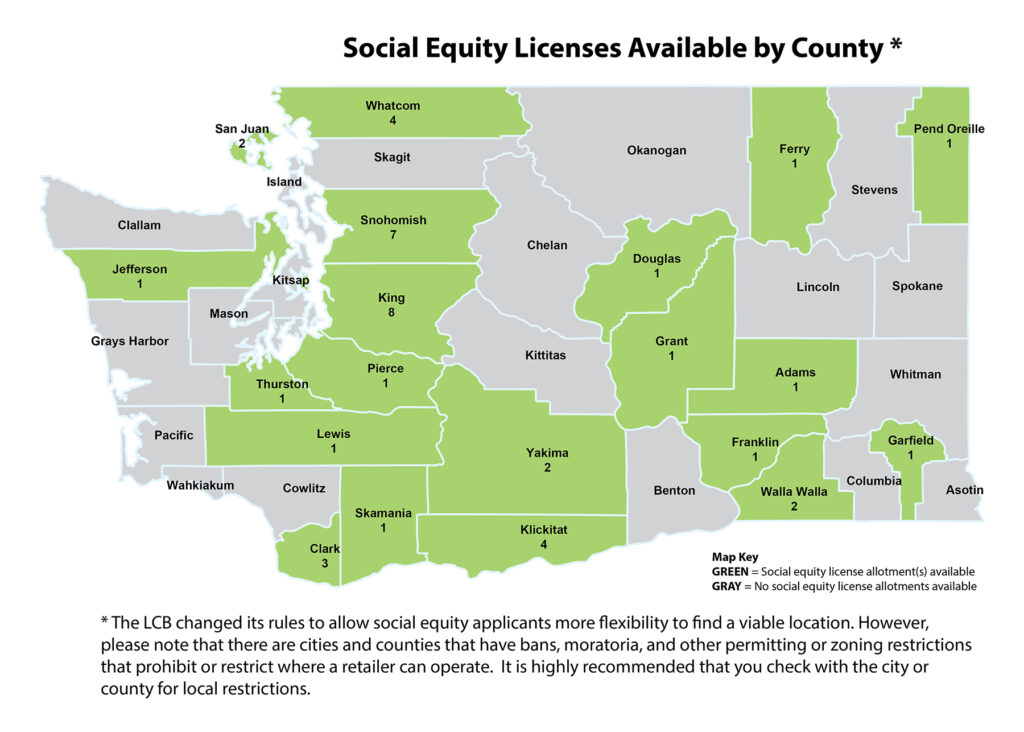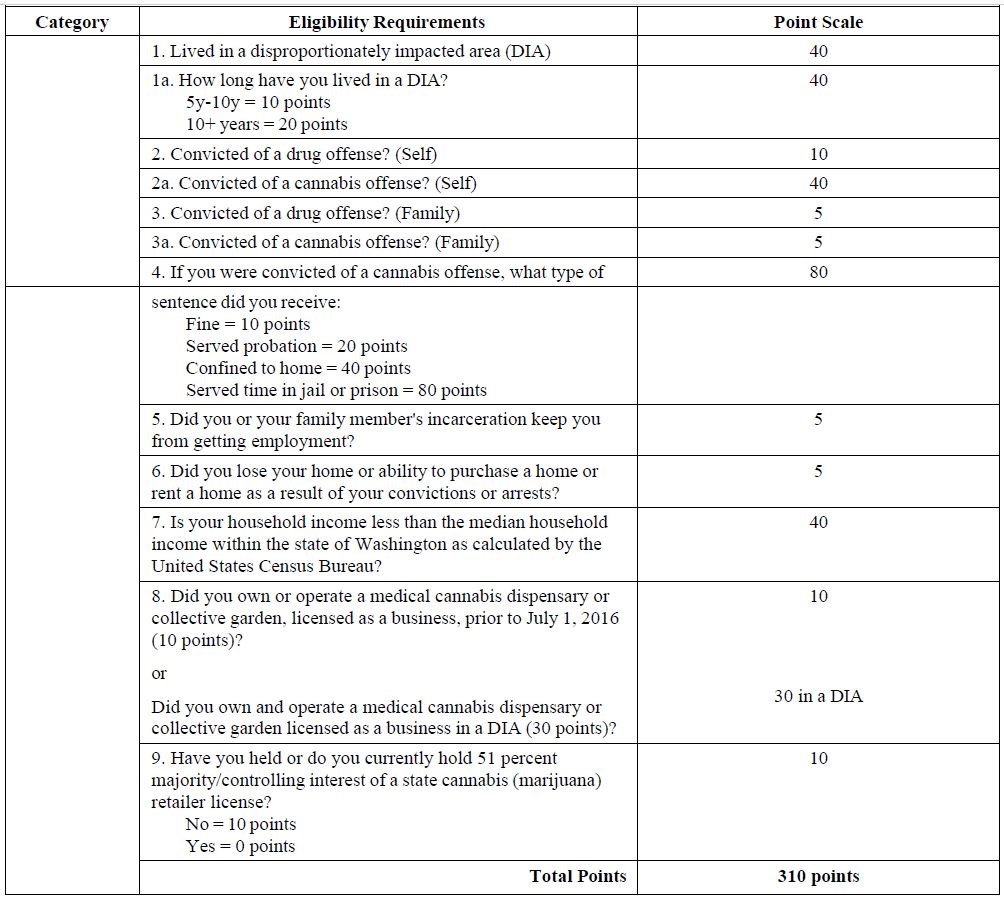Alert
WA Application Period for Social Equity Marijuana Retail Licenses Opens March 1
Read Time: 7 mins
The Washington State Liquor and Cannabis Board (WSLCB) will open the application period for Social Equity marijuana retail licenses on March 1, 2023. The application period will close on March 30, 2023.
More than 40 marijuana retail licenses that were forfeited, canceled, revoked, or never issued will be made available to social equity applicants in specific jurisdictions across the state. Below is everything applicants need to know to get started.
Jump to a section:
- What Licenses Are Available?
- Qualifications and Scoring
- Social Equity Plan Requirements
- Documentation Requirements
- Next Steps
What Licenses Are Available?
The WSLCB can issue up to 44 licenses total, with a specific number allotted in specific counties (see map below). Please note, however, that there are Washington cities and counties which have bans, moratoria, and other permitting or zoning restrictions regarding whether/where a licensed marijuana retailer can operate.
One key update to the application process – which is highly beneficial to applicants – is a significant relaxation of the WSLCB’s previous requirements. Applicants no longer need a location identified or a lease agreement for a specific premises within the particular county in place to apply for a license. Nevertheless, these local jurisdiction considerations are significant and could prohibit an applicant from operating within a given county (though there are processes at the WSLCB to relocate a license).
The WSCLB makes this interactive Marijuana Municipal Zoning map available. Applicants are strongly advised to check with an attorney, or inquire directly with the relevant city or county, to understand how these local restrictions can affect an applicant’s ability to operate a marijuana business in a given area.

Qualifications and Scoring
In order to qualify for a license, a person (or persons) who has (or have) resided in Washington state for six months prior to the application date and who holds at least a 51%, or a controlling, interest in the applicant business must meet at least two of the following three requirements:
- lived in a disproportionately impacted area (DIA) in Washington state for a minimum of five years between 1980 and 2010;
- DIAs can be located by searching for a given address on this page
- applicant or a family member has been arrested or convicted of a cannabis offense;
- A “family member” is defined in the social equity rules as a:
- (a) biological, adopted, or foster child, a stepchild, a child’s spouse, or a child to whom the applicant stands in loco parentis (in place of the parent), is a legal guardian, or is a de facto parent, regardless of age or dependency status;
- (b) grandchild, grandparent, parent, or sibling of a child;
- (c) spouse or domestic partner;
- (d) any individual:
- who regularly resides in the applicant’s home, and depends on the applicant for care; or
- where the relationship between the applicant and the individual creates an expectation that the applicant care for the individual, and the individual depends on the applicant for care; or
- who cares for the applicant, and the applicant depends on the individual for care.
- A “family member” is defined in the social equity rules as a:
- household income was less than $82,400 (median household income within the state of Washington).
New companies formed with the intention of holding a license must properly create and register the new business entity (which entity will then be the “applicant”) with the Secretary of State ahead of time, and receive a Unified Business Identifier (UBI) at the end of that process. This UBI is required to apply under a corporation or an LLC. (Note: A person who meets the qualifying criteria above must hold at least 51% of the interests in that business.)
Applicants will be scored according to the following rubric, published by the WSLCB:

Social Equity Plan Requirements
In addition to submitting required documentation (outlined below), applicants must also submit a “social equity plan” describing how they will meet social equity goals if awarded a license. Social equity goals seek to reduce the accumulated harm to communities subjected to the historical application and enforcement of cannabis prohibition.
Briefly, a Social Equity Plan must include at least one of the components below. Upon the opening of the application period on March 1, 2023, applicants will receive a copy of the Cannabis Social Equity Plan and instructions on submitting this and other forms, as well as verifying documentation, as part of their application. On the Social Equity Plan form, applicants may select the pre-filled examples set forth below, or propose their own activities:
- A description of how issuing a cannabis retail licenses will support the applicant in meeting social equity goals, such as:
- Collect donations for school supplies for underserved communities
- Holiday adopt-a-family/child in need
- Employee volunteer day event to make a difference in an underserved community
- Another proposed idea
- A personal or family history with the criminal justice system, including any offenses involving cannabis, if applicable
- How the business plans to partner with or assist organizations connected to communities that have been disproportionately impacted by cannabis prohibition, such as:
- Non-perishable food drive
- Partner with a local nonprofit for community strengthening project
- Partner with employment agency to hire applicants with cannabis offenses
- Promote hiring employees with prior offenses on website or premises
- Another proposed idea
For additional assistance developing this component of the application, the WSLCB’s Cannabis Technical Assistance Program offers suggestions in Lesson 5 of its Social Equity Program Education series titled “How to Complete the Social Equity Plan.” And while the 44 licenses are intended to be awarded to the highest-scoring applicants, applications that do not include the Social Equity Plan components listed above will not be considered by the WSLCB.
Documentation Requirements
In order to verify social equity eligibility, applicants must also submit applicable documents to a third-party contractor (Ponder Diversity Group). Obtaining, compiling, and formatting these documents and formatting them electronically can be incredibly time consuming. And for applicants with criminal histories, and/or who have experienced employment and/or housing impacts as a result of incarceration, conviction, or arrest, requesting and obtaining these records can sometimes take more than a month. That means applicants who start preparing their application too late may miss the application window.
A complete list of acceptable categories and documents that must be submitted can be found here, but generally include all of the following (except where noted as “examples”):
- Identification Verification – Washington Driver’s License; Social Security Card; Government Employee ID card (state or federal); Professional license (if applicable, i.e. nurse, physician, engineer, etc.); Veteran Administration Identification with photograph (if applicable)
- Household Income Verification – Proof of last year’s household income: Most recent federal tax return; IRS tax form W-2; Student IDs or confirmation of secondary education status (if applicable); Affidavits from unemployed applicants (if applicable)
- Residency Verification – Residency documentation must show that the applicant has lived in Washington for at least six months prior to their application submission
- Examples Include: Federal, state, or local government-issued identification (or driver’s license) card showing applicant’s name; Utility bill addressed to the applicant; Bank statements or credit card bills; Residential lease or rental agreements with the name of the applicant as lessee or renter; Pay stubs that show the applicant’s name and Washington address; School records that show the applicant’s address
- Verification of Time Spent in a Disproportionately Impacted Area (DIA) – Applicants must show prior residency in a DIA for at least five years between 1980 and 2010
- Examples Include: Washington Driver’s License or other government-issued identification card showing applicant’s name; Utility bill addressed to the applicant; Residential lease or rental agreements with the name of the applicant as lessee or renter; Deed or title to real estate residential property; Pay stubs or school records that show the applicant’s name and Washington address; Mortgage or bank loan documents that show the applicant’s address; Tax returns and records; Vehicle registration; Voter registration card; Statements from a major credit card company
- Arrest and/or Conviction Information – (Note: If conviction, all must be provided if applicable in the jurisdiction where the conviction occurred. If only arrest, the first four items listed here are examples.) Criminal history background report; Applicant’s arrest record; Applicant’s family member arrest record (must include an affirmation of the familial relationship signed by the applicant and the family member); Other court document related to the conviction or vacated sentence; Sentencing report; Probation report; Record of judgement and conviction; Record of plea, verdict and sentence; Docket entry from court record that indicate the existence of a conviction; Minutes of a court proceeding or transcript of a hearing that indicates the existence of a conviction; Abstract of a record of conviction prepared by the court in which the conviction was entered, or by a state official associated with the state’s repository of criminal justice records, that indicates the following: (a) The charge or section of the law violated; (b) The disposition of the case; and (c) The existence and date of conviction; and the sentence
- Employment Impact of Incarceration –
- Examples Include: Email from an employer which rejects or terminates employment and identifies incarceration as the reason for the rejection or termination; Affidavit from persons with direct knowledge of the rejection or termination of employment as well as reasoning that the rejection or termination of employment was because of the applicant’s or the applicant’s family member’s incarceration; Court records which show that the applicant was terminated or denied employment due to the applicant or the applicant’s family member’s incarceration
- Housing Impact of Convictions or Arrests –
- Examples Include: Email from banks or landlords denying a mortgage or rental to the applicant due to the applicant’s drug convictions or arrests; Affidavit from persons with direct knowledge of the denial of mortgage or rental due to the applicant’s convictions or arrests; Court records which show that the applicant was denied housing due to drug convictions or arrests
- Ownership Verification –
- Examples Include: Partnership agreement; Certificate of membership; Stock certificates and ledger; Washington business registration; Ownership statement; Corporate tax returns; Profit-sharing agreement
- Other Documents Not Listed – Applicants are permitted to upload additional documents which may verify eligibility, which will be evaluated based on the date, credibility, and source of the documents submitted
Next Steps
Individuals or businesses considering submitting an application next month may want to take the following steps as soon as possible:
- Ensure that the person with a controlling interest in the applicant business entity meets the qualifying criteria;
- Gather supporting documentation;
- Set up, register, document, and execute the required documents for the new business entity (applicant);
- Review the 44 available licenses, the relevant counties, and understand the local laws, regulations, and rules that affect if and how a cannabis business can operate there;
- Create a Secure Access Washington (SAW) account;
- Review WSLCB webinars and receive training and support through the Technical Assistance Program;
- Develop a social equity plan.
This process is complex and applicants are well advised to engage experienced counsel to maximize their chances of submitting a successful application for licensure.
